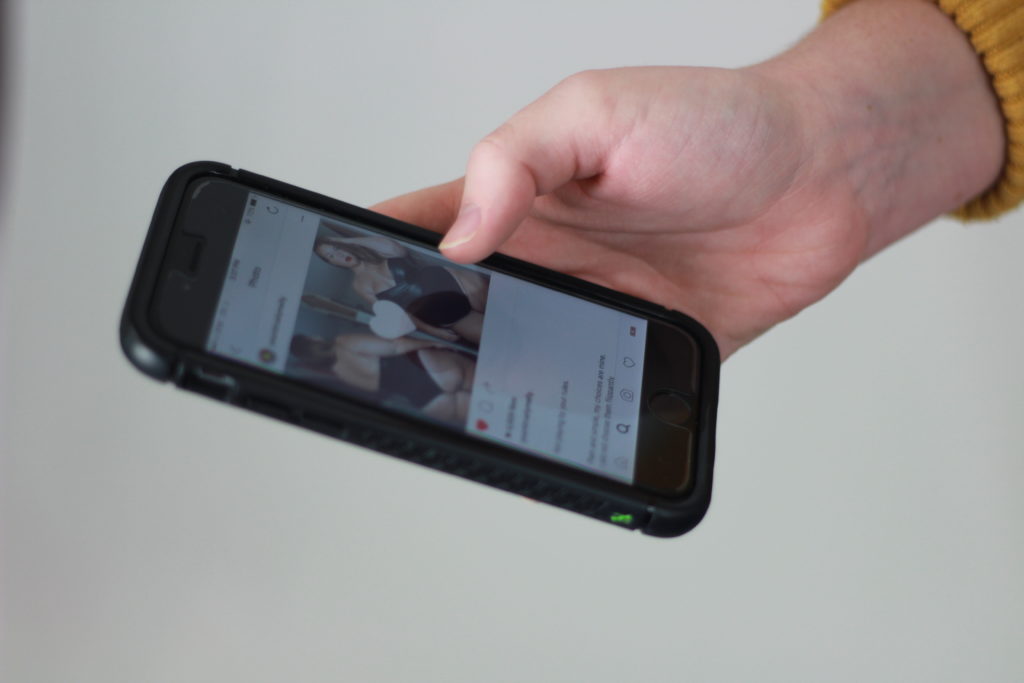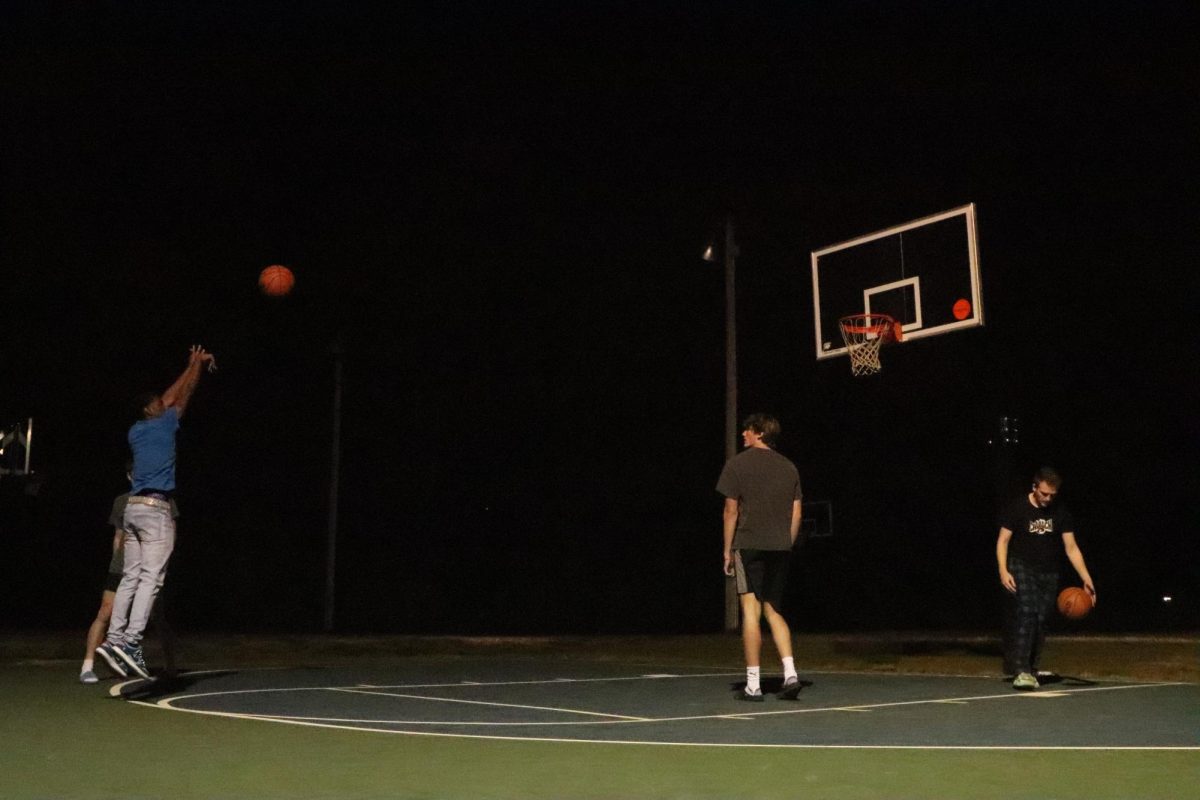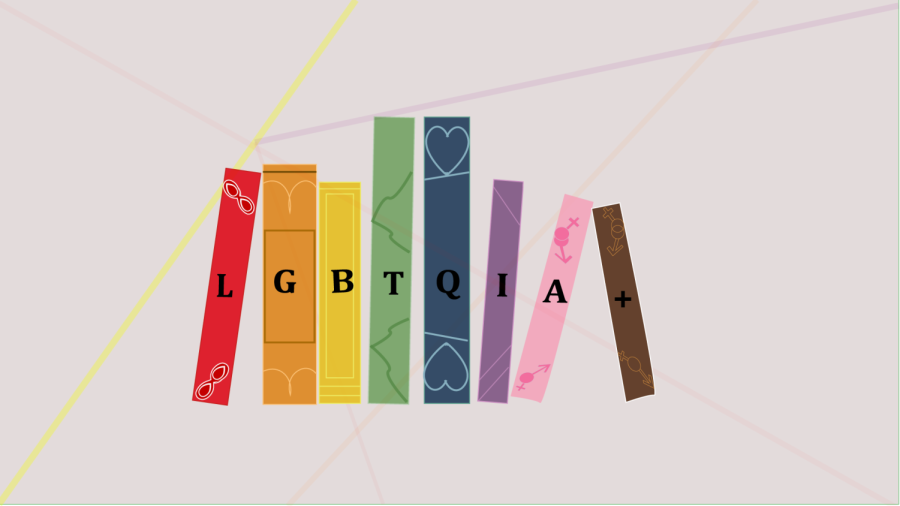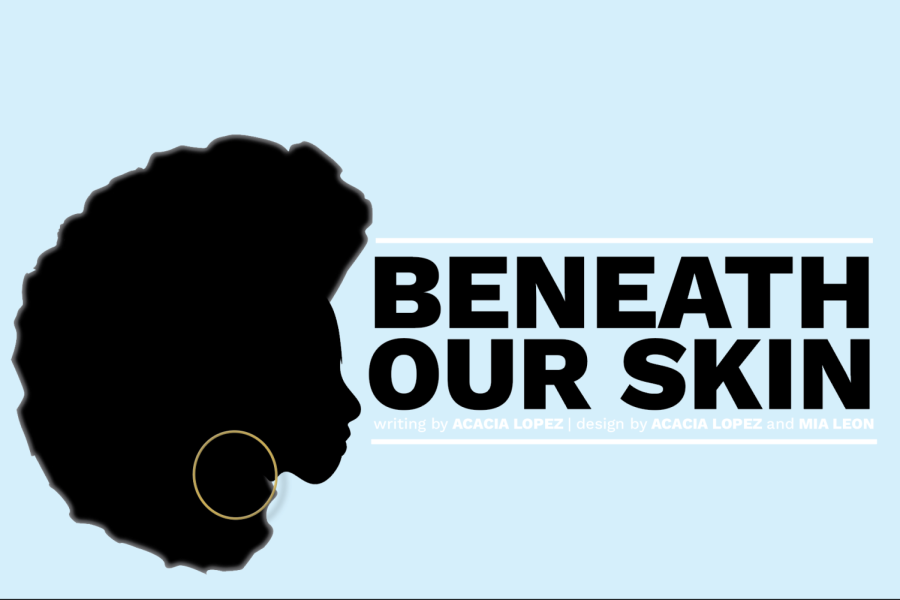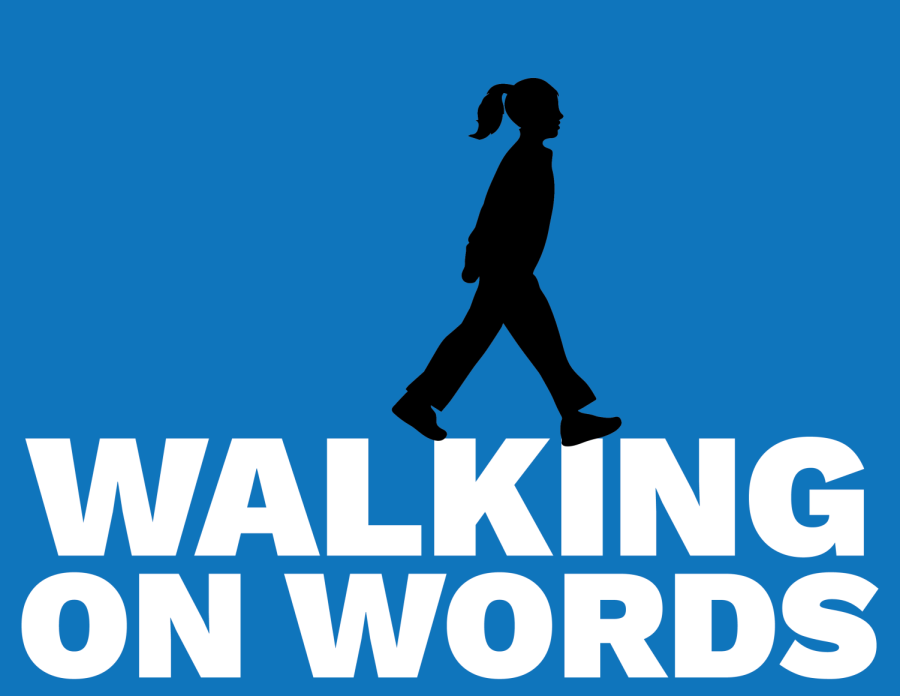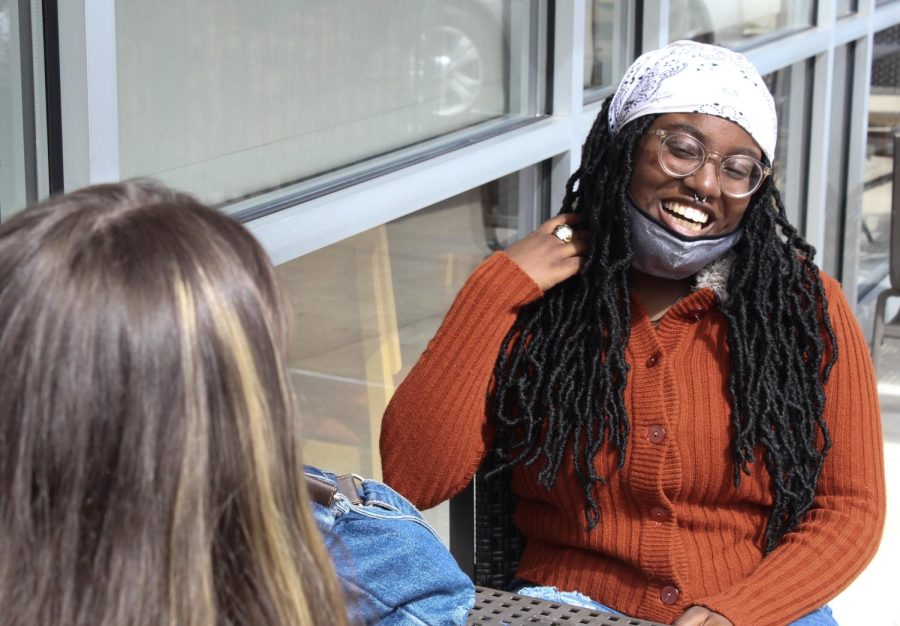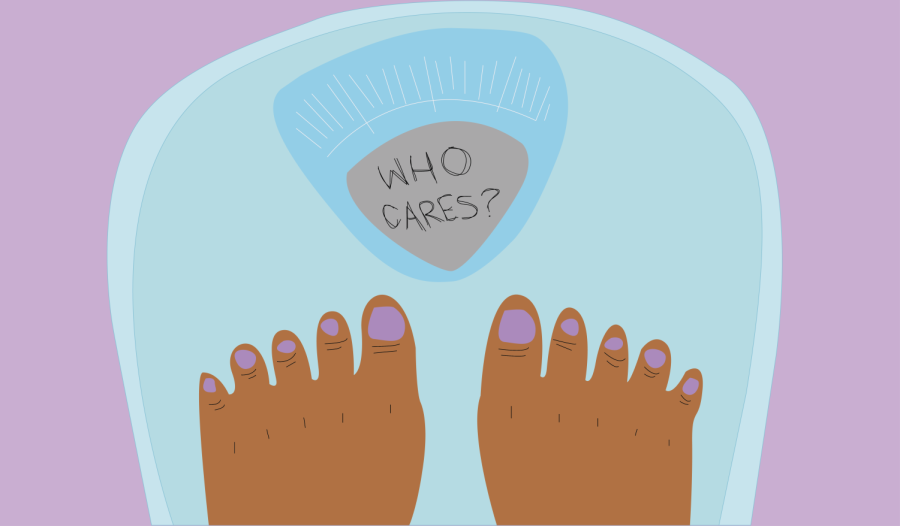Belle Phothirath clutched her stomach as she walked steadily towards Carroll High School. The scene was innocent at first glance, giddy students buzzing with ‘first-day-of-school’ excitement, but a nightmare to 14-year-old Phothirath.
Phothirath’s high school consisted of teens sporting all different looks, from spiffy, to sparkly, to spunky or sporty; yet, despite the diversity among Phothirath’s peers, she felt especially singled out by bullies. In hindsight, Phothirath wished her classmates had targeted her outfits, but they seemed to be bothered by another aspect of her exterior: her weight.
Phothirath walked with her head facing the floor, scared to make eye contact with any of the passing students as she blindly navigated the halls. Halfway through her haphazard beeline for homeroom, an unknown girl shoved Phothirath off her track and onto the floor. Phothirath’s single folder was now out of reach from her fallen body.
“Watch where you go, fattie,” a girl she didn’t recognized said.
Phothirath’s knees ached, her palms were bruised, and she was beyond frazzled as she peered through the crowd of traveling legs for the papers that were now strewn across the walkway.
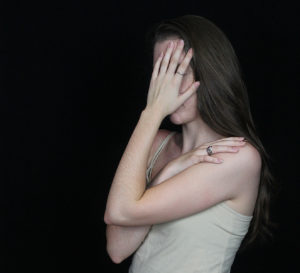
“Do not cry,” she thought, squeezing her eyes. “Breathe.” Phothirath inhaled sharply, silently reminding herself, “You’re fine, it’s fine.”
Phothirath struggled to get out her words, “I’m sorry, I was just–”
The girl’s irked voice interrupted Phothirath’s faint apology: “Maybe if you took up less space, I wouldn’t have run into you, huh?”
Phothirath timidly made her way to class, trying to convince herself that she probably would not encounter the girl again; but the uneasiness in the back of her mind became reality when the girl’s taunting continued daily. Days of bullying turned into weeks, and weeks into months.
“She made comments about what I wore to what I ate. She was relentless,” Phothirath said.
The frequent bullying plagued Phothirath’s fragile confidence. She felt defeated, and began to believe that the issue was completely out of her hands.
Phothirath had hoped high school would be her fresh start; in her words – “a monumental moment where I could finally venture into a new territory.”
However, the torment she had faced throughout her elementary and middle school years soon became a common theme in high school as well. Even trusted adults offered little refuge to the habitual bullying Phothirath faced.
Adults often mocked her body, in fact, Phothirath remembers once being told, “Lose weight; boys like skinny girls, people can’t take fat people seriously.”
In the midst of Phothirath’s sophomore year the bullying had reached its peak; it was then that she decided enough was enough. Enough of her peers’ comments about how she was “too chubby.” Enough of her parents’ constant judgment and disapproval of her body type. Enough.
It became apparent to Phothirath that these harsh criticisms were suppressing her self-worth and confidence. She didn’t feel comfortable in her own skin, and for her that wasn’t okay.
Rather than continuing to endure this negativity, Phothirath created her Instagram, which quickly her safe place: @religouslysad.
Like many teens, she started her Instagram as a place to express her interests, but as insults regarding her weight continued to plague her, the tone of her account began to shift.
“I turned to Instagram and posted about my body. I tried to change the negativity into positivity for myself,” Phothirath said.
Her followers quickly began to leave empathetic comments to Phothirath, the vulnerable, open girl who was comfortable enough to share a part of her life from behind the screen. Ironically, as Phothirath’s followership gradually increased her posts became more and more personal. Most of her posts are of herself and her body, but Phothirath also shares the more casual parts of her life, like what makeup she wants or her work troubles.
“A lot of people think I post for sexual attention or compliments, but I don’t,” Phothirath said. “Yes, comments are amazing, but I post to show everyone that I love my body no matter what people say, because I’m a brave individual who loves herself.”
Phothirath’s account has skyrocketed from a mere 200 followers to an ever-growing 24,800 in the three years she has run the account. She now sees @religouslysad as a means to empower others while simultaneously lifting her own confidence.
Because Phothirath is sharing a part of her life so publically, she has to be wary of who she allows to follow her. She has gotten in trouble with her school over the content of her posts and now prioritizes precautionary measures, like keeping her account private to prevent her from being exposed again.
Like Phothirath, many young adults have turned to social media to express themselves since its introduction to modern society in the early 2000s.
According to Dr. Keith Campbell, head of Industrial-Organizational, Brain and Behavioral Sciences at the University of Georgia, “Social networking websites – nonexistent just years ago – have drawn literally millions of users. Web sites such as MySpace and Facebook have been at the forefront of this migration.”
MySpace engaged the young adult demographic with music, music videos, and an edgy, individualistic environment that attracted users from all over the world.
As the MySpace frenzy declined around 2009, new and improved sites like Twitter and Facebook began to popularize, followed by Instagram, which rapidly became part of pop culture in 2010. These three apps have topped app charts and Google searches for years, according to Tech Radar.
In contrast to social media’s new place in the modern world, body image – or the subjective view people have of their own body – has been a relevant part of society for centuries.
According to Campbell, the mingling between social media and body image has influenced the way late millennials see themselves, creating a never before seen social attitude.
Dr. Cheri Levinson, Assistant Psychology Professor at the University of Louisville, claims the media’s reinforcement of physical appearance is detrimental to how people see their bodies; however, maybe it’s not the consistent focus on outward appearance that is detrimental, but society’s view of what that appearance should look like.
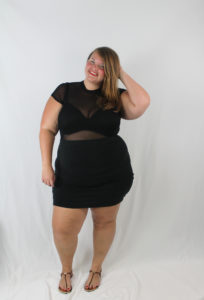
In fact, many young social media users, like Louisville’s Insta-sensation Melissa Gibson, widely known as @yourstruelymelly, disagree with the idea that social media is a detriment. As a 28-year-old graduate student at University of Louisville with 146,000 Instagram followers, Gibson believes that social media has an amazing power to be used in a way that positively affects people’s body images.
“You know, for the first time in forever we have a way to put ourselves out into the world,” Gibson said, “with our own message of who we are, who we want to be, and who we see ourselves as, and that is incredibly empowering.”
Gibson views social media as a peek into her life, an extension of who she is. Instagram offers her a platform to have a voice and represent herself in a society that regularly looks down on women with her body type.
“I use Instagram as a tool to define my existence as a fat woman,” Gibson said, “but I also want to fight back against the beauty standards and the lies that our society teaches us about who’s worthy to feel good about themselves.”
Despite the efforts of people like Gibson, who want to use social media to empower themselves and others, Levinson believes that societal standards play a huge role in body image. Levinson discussed a theory present in eating disorder research that provides reason for why eating disorders and negative body image are so present in the 21st century.
Levinson explains that society rewards individuals who lose weight. She claims that an example of how society reinforces thin-ideals, or the idea that being slim is superior, can be found in actions as simple as offering a compliment over losing weight, or looking thin.
In fact, according to The National Eating Disorders Association (NEDA), a non-profit in the United States advocating on behalf of and supporting individuals and families affected by eating disorders, “cultural pressures that glorify ‘thinness’ or muscularity and place value on obtaining the ‘perfect body,’ contribute to the modern eating disorder epidemic.”
Social media fosters an environment for individuals like Gibson to counter this phenomenon. Gibson feels as if her posts provide a genuine glimpse into her reality, a reality where many conclude that she does not have the body type to live confidently. Yet, Gibson expressed that the very essence of her account fights to prove that no matter what people look like, they deserve to be valued by society, deserve to be heard, and deserve to be treated just like anyone else.
The sentiment behind @yourstruelymelly has the potential to impact countless members of the Insta-verse; in fact, Levinson said that accounts like @yourstruelymelly that focus on empowerment make people more aware.
“If there is more education on the dangerousness of focusing on a thin-ideal we will see more of a push to accept bodies of all types,” Levinson said.
Phothirath also encourages others to support and advance the body positivity movement with her account.
“I feel that I am an advocate for all girls and guys. Not just the curvy, busty girls, but also the skinny girls, or the average girls,” Phothirath said, “I want everyone to know that their body is unique and that someone will love it.”
Although Phothirath and Gibson started their accounts for themselves, they both agree one of the most rewarding aspects of their accounts is the impact they have on others. Not only are they able to support themselves, but they can simultaneously prompt acceptance for body positivity in their followers.
“It’s kind of like this two-part game where it’s challenging society to be better,” Gibson said. “It’s important to humanity that we can all encourage each other and celebrate one another.”
Not only are individuals like Phothirath and Gibson spreading the idea that it is okay to love yourself, but global movements have begun to use social media to promote body positivity campaigns as well.
In Gibson’s opinion, before the presence of the internet and sites like Instagram, magazines were the primary medium that focused acutely on appearance and body, and thus hold the power to define society’s beauty standards. Now, through social media, individuals control what they want to post and can therefore define their message for themselves.
For example, the #Fatkini movement, a viral campaign started in 2012 by 25-year-old fashion blogger, Gabi Gregg, features proud plus-size women taking selfies in their bathing suits, something that might have been unheard of a decade ago, when mainstream magazines were one of the only places to find fashion.
Although ubiquitous body positivity for all body types is still not entirely accepted by society, internet users have taken strides to make campaigns like the #Fatkini movement more well received.
Levinson has noticed this trend, stating, “Bodies are amazing things and they are beautiful at every size. I am happy to see movement in our society towards this direction.”
Although there has been a noticeable shift in society’s overall view of body positivity, negativity still surrounds the issue.
“Being on the internet can be really hard at times; I mean I am acutely aware everyday of how my body is perceived because people tell me on the internet,” Gibson said.
But, through the evolution of Gibson’s account and the progression of her self confidence she has learned to ignore arguments that try to disempower her.
“I have a hard time dealing with the amount of hate I get; I break down sometimes,” Phothirath said of the negative comments on her page. “But I post about myself because I want to and because it’s my body, and I’m allowed to freely post what I want.”
Phothirath finds it shocking how much her account has impacted her. She doesn’t like to say it changed her, because Phothirath believes she was always the beautiful Belle she sees herself as now. She just no longer surrenders to societal standards that suppress her self worth.
“Some days I feel a lil’ chubby, but I still go out and rock my crop top, because I have gone so long with the mindset that my body is beautiful, and,” Phothirath said, “I’ve actually started to believe it.”


